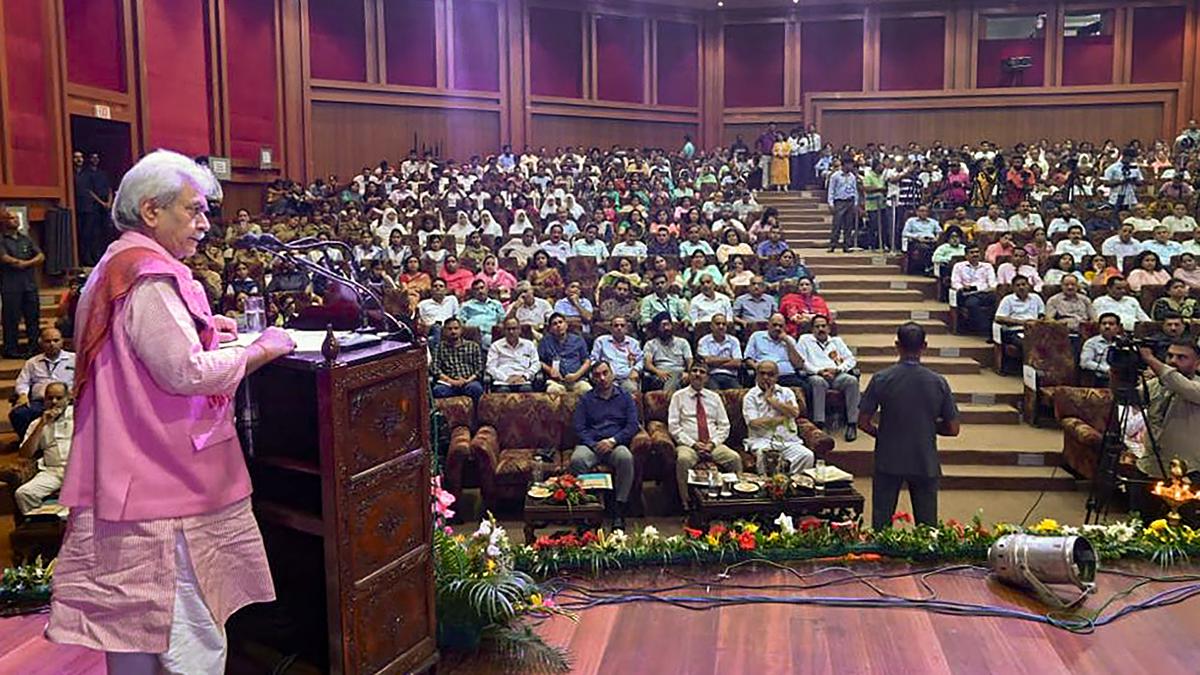
Stop sheltering terrorists, says J&K L-G Manoj Sinha in Sopore
The Hindu
JL-G Manoj Sinha pledges to root out terrorism from J&K; asks locals to stop sheltering terrorists; visits Sopore, a separatist hub; promises to take strict action against conflict profiteers
Jammu & Kashmir (J&K) Lieutenant-Governor (L-G) Manoj Sinha on Thursday pledged to root out terrorism from the Union Territory (U.T.) and asked locals to stop sheltering terrorists, as he toured once a separatist hub, Sopore, in north Kashmir.
“Locals from Sopore and entire J&K should not give any sort of shelter to terror supporters and terrorists. Do this bit, our police and security forces with full support of the administration will ensure terror and its eco-system is wiped out from the soil of J&K,” Mr. Sinha, while speaking in Sopore, said.
Sopore witnessed a major armed rebellion in the 1990s. It was also the hometown of former Hurriyat chairman and Jamaat-e-Islami member Syed Ali Shah Geelani.
Pledging to root out terrorism and take strict action against the “conflict profiteers”, Mr. Sinha said, “Sopore was called Kandahar. Who gave this title? It was a famous business hub till 1970. Those responsible for this did great injustice with the people of Sopore and the future generations.”
Quoting popular poet Mehjoor on communal harmony, Mr. Sinha said, “Mr. Mehjoor said ‘if Muslims are milk, Hindus are Sugar’. Sopore was known for communal harmony. We will ensure peace returns to this place soon.”
He said every single resident of J&K was a VIP for the L-G administration. “There is no discrimination,” he added.

“Writing, in general, is a very solitary process,” says Yauvanika Chopra, Associate Director at The New India Foundation (NIF), which, earlier this year, announced the 12th edition of its NIF Book Fellowships for research and scholarship about Indian history after Independence. While authors, in general, are built for it, it can still get very lonely, says Chopra, pointing out that the fellowship’s community support is as valuable as the monetary benefits it offers. “There is a solid community of NIF fellows, trustees, language experts, jury members, all of whom are incredibly competent,” she says. “They really help make authors feel supported from manuscript to publication, so you never feel like you’re struggling through isolation.”

Several principals of government and private schools in Delhi on Tuesday said the Directorate of Education (DoE) circular from a day earlier, directing schools to conduct classes in ‘hybrid’ mode, had caused confusion regarding day-to-day operations as they did not know how many students would return to school from Wednesday and how would teachers instruct in two modes — online and in person — at once. The DoE circular on Monday had also stated that the option to “exercise online mode of education, wherever available, shall vest with the students and their guardians”. Several schoolteachers also expressed confusion regarding the DoE order. A government schoolteacher said he was unsure of how to cope with the resumption of physical classes, given that the order directing government offices to ensure that 50% of the employees work from home is still in place. On Monday, the Commission for Air Quality Management in the National Capital Region and Adjoining Areas (CAQM) had, on the orders of the Supreme Court, directed schools in Delhi-NCR to shift classes to the hybrid mode, following which the DoE had issued the circular. The court had urged the Centre’s pollution watchdog to consider restarting physical classes due to many students missing out on the mid-day meals and lacking the necessary means to attend classes online. The CAQM had, on November 20, asked schools in Delhi-NCR to shift to the online mode of teaching.









